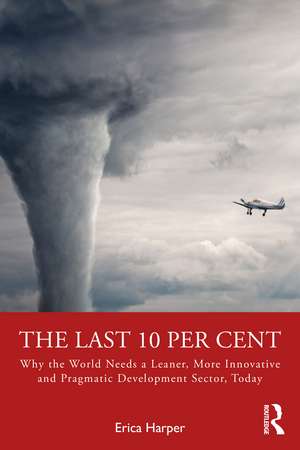The Last 10 Per Cent: Why the World Needs a Leaner, More Innovative and Pragmatic Development Sector, Today
Autor Erica Harperen Limba Engleză Paperback – 28 mar 2023
Engaging, provocative and clear sighted, the book provides insight into interventions around democratic governance, refugee response, counterterrorism, gender mainstreaming, environmental protection and private sector engagement. It is instructive reading for professionals across the development sector, think tanks and NGOs.
| Toate formatele și edițiile | Preț | Express |
|---|---|---|
| Paperback (1) | 229.61 lei 43-57 zile | |
| Taylor & Francis – 28 mar 2023 | 229.61 lei 43-57 zile | |
| Hardback (1) | 891.61 lei 43-57 zile | |
| Taylor & Francis – 28 mar 2023 | 891.61 lei 43-57 zile |
Preț: 229.61 lei
Nou
Puncte Express: 344
Preț estimativ în valută:
43.94€ • 45.60$ • 36.73£
43.94€ • 45.60$ • 36.73£
Carte tipărită la comandă
Livrare economică 17-31 martie
Preluare comenzi: 021 569.72.76
Specificații
ISBN-13: 9781032454344
ISBN-10: 1032454342
Pagini: 208
Ilustrații: 1 Tables, black and white
Dimensiuni: 156 x 234 x 14 mm
Greutate: 0.34 kg
Ediția:1
Editura: Taylor & Francis
Colecția Routledge India
Locul publicării:Oxford, United Kingdom
ISBN-10: 1032454342
Pagini: 208
Ilustrații: 1 Tables, black and white
Dimensiuni: 156 x 234 x 14 mm
Greutate: 0.34 kg
Ediția:1
Editura: Taylor & Francis
Colecția Routledge India
Locul publicării:Oxford, United Kingdom
Public țintă
PostgraduateRecenzii
"Carefully written and lucidly presented, Harper takes readers on a deep dive into the geopolitics of aid provision, making an irrefutable case for why everyone has a stake in human development outcomes."
Helen Clark, Administrator of the United Nations Development Programme (2009–2017)
"A pathbreaking examination of how political economy in aid provision is obstructing progress towards a safer, more equal and socially-cohesive world. Strongly recommended for practitioners, donors and policy makers alike."
Ertharin Cousin, Executive Director of the United Nations World Food Programme (2012–2017)
"A major contribution to the scholarship on development effectiveness. Harper takes the frustration held by many and packages it in a solution-oriented account of how development cooperation can be transformed and strengthened in a pragmatic way but always keeping a people centered approach where their rights are respected, protected and promoted."
Najat Maalla M'jid, Special Representative of the Secretary-General on Violence against Children
"In this highly readable exploration of development processes, Harper sets out a constructive argument for how better outcomes can be achieved by understanding the political economy of aid flows, making better use evidence and fostering innovation."
Gillian Triggs, UN Assistant Secretary-General and Assistant High Commissioner for Protection with UNHCR
Helen Clark, Administrator of the United Nations Development Programme (2009–2017)
"A pathbreaking examination of how political economy in aid provision is obstructing progress towards a safer, more equal and socially-cohesive world. Strongly recommended for practitioners, donors and policy makers alike."
Ertharin Cousin, Executive Director of the United Nations World Food Programme (2012–2017)
"A major contribution to the scholarship on development effectiveness. Harper takes the frustration held by many and packages it in a solution-oriented account of how development cooperation can be transformed and strengthened in a pragmatic way but always keeping a people centered approach where their rights are respected, protected and promoted."
Najat Maalla M'jid, Special Representative of the Secretary-General on Violence against Children
"In this highly readable exploration of development processes, Harper sets out a constructive argument for how better outcomes can be achieved by understanding the political economy of aid flows, making better use evidence and fostering innovation."
Gillian Triggs, UN Assistant Secretary-General and Assistant High Commissioner for Protection with UNHCR
Cuprins
Acknowledgments
Introduction: is a little bit of sunlight the disinfectant the aid sector needs?
1 How the West got rich, and other curious questions around human development
2 Broken, by design
3 Towards the aid sector we need
4 The Samaritan dilemma: promoting good governance in fragile and poverty-affected states
5 Innovating humanitarian response
6 Exploiting the sweet spots
7 Playing politics to win
8 Development beyond the development sector
9 Charting a pathway towards enhanced aid effectiveness
Index
Introduction: is a little bit of sunlight the disinfectant the aid sector needs?
1 How the West got rich, and other curious questions around human development
2 Broken, by design
3 Towards the aid sector we need
4 The Samaritan dilemma: promoting good governance in fragile and poverty-affected states
5 Innovating humanitarian response
6 Exploiting the sweet spots
7 Playing politics to win
8 Development beyond the development sector
9 Charting a pathway towards enhanced aid effectiveness
Index
Notă biografică
Erica Harper is the Head of Research and Policy Studies at the Geneva Academy of International Humanitarian Law and Human Rights. She also serves as an affiliate researcher at the Van Vollenhoven Institute, Leiden University, Netherlands.
Descriere
This book studies the role of the development sector in eliminating extreme poverty, fast-tracking growth, and preventing conflict in a post-pandemic world.
